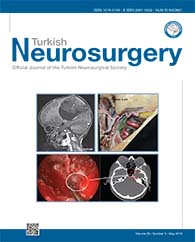2Adnan Menderes University, Faculty of Medicine, Department of Neurosurgery, Aydin, Turkey
3Adnan Menderes University, Faculty of Medicine, Department of Pathology, Aydin, Turkey DOI : 10.5137/1019-5149.JTN.24773-18.1 AIM: To clarify the effects of topical application of curcumin on the prevention of epidural fibrosis.
MATERIAL and METHODS: Twenty-one rats were randomly divided into three equal groups (control, spongostan, local curcumin) and a laminectomy procedure was performed between T11 and L1 in all rats. Subsequently, spongostan soaked with curcumin (100 mg/kg) was applied topically. After four weeks, the vertebral column from T9 to L3, which included the paraspinal muscles and epidural scar tissue, was removed as a single piece and the epidural fibrosis and arachnoidal scarring were graded and histopathological analysis carried out accordingly. Kruskal-Wallis and Pearson Chi-Square tests were used for statistical analysis. A p-value of less than 0.05 was considered to be significant.
RESULTS: The grading of epidural fibrosis was far lower in the experimental group with curcumin compared to the control and spongostan groups, but the difference was not statistically significant.
CONCLUSION: The findings of this study show that local curcumin decreases the formation of epidural fibrosis and this effect of curcumin is thought to be mediated by reducing the functions of inflammatory cells such as macrophages, neutrophils and fibroblasts, and the anti-inflammatory and antioxidant effects.
Keywords : Laminectomy, Epidural fibrosis, Failed back surgery, Curcumin, Rat




